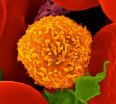(Press-News.org) A team of UC San Francisco researchers has found that a tiny segment of genetic material known as a microRNA plays a central role in the transition from moderate drinking to binge drinking and other alcohol use disorders.
Previous research in the UCSF laboratory of Dorit Ron, PhD, Endowed Chair of Cell Biology of Addiction in Neurology, has demonstrated that the level of a protein known as brain-derived neurotrophic factor, or BDNF, is increased in the brain when alcohol consumed in moderation. In turn, experiments in Ron's lab have shown, BDNF prevents the development of alcohol use disorders.
In the new study, Ron and first author Emmanuel Darcq, PhD, a former postdoctoral fellow now at McGill University in Canada, found that when mice consumed excessive amounts of alcohol for a prolonged period, there was a marked decrease in the amount of BDNF in the medial prefrontal cortex (mPFC), a brain region important for decision making. As reported in the October 21, 2014 online edition of Molecular Psychiatry, this decline was associated with a corresponding increase in the level of a microRNA called miR-30a-5p.
MicroRNAs lower the levels of proteins such as BDNF by binding to messenger RNA, the molecular middleman that carries instructions from genes to the protein-making machinery of the cell, and tagging it for destruction.
Ron and colleagues then showed that if they increased the levels of miR-30a-5p in the mPFC, BDNF was reduced, and the mice consumed large amounts of alcohol. When mice were treated with an inhibitor of miR-30a-5p, however, the level of BDNF in the mPFC was restored to normal and alcohol consumption was restored to normal, moderate levels.
"Our results suggest BDNF protects against the transition from moderate to uncontrolled drinking and alcohol use disorders," said Ron, senior author of the study and a professor in UCSF's Department of Neurology. "When there is a breakdown in this protective pathway, however, uncontrolled excessive drinking develops, and microRNAs are a possible mechanism in this breakdown. This mechanism may be one possible explanation as to why 10 percent of the population develop alcohol use disorders and this study may be helpful for the development of future medications to treat this devastating disease."
One reason many potential therapies for alcohol abuse have been unsuccessful is because they inhibit the brain's reward pathways, causing an overall decline in the experience of pleasure. But in the new study, these pathways continued to function in mice in which the actions of miR-30a-5p had been tamped down—the mice retained the preference for a sweetened solution over plain water that is seen in normal mice.
This result has significant implications for future treatments, Ron said. "In searching for potential therapies for alcohol abuse, it is important that we look for future medications that target drinking without affecting the reward system in general. One problem with current alcohol abuse medications is that patients tend to stop taking them because they interfere with the sense of pleasure."
INFORMATION:
Also participating in the study were postdoctoral fellows Vincent Warnault, PhD, and Feng Liu, PhD; former postdoctoral fellow Gabriel Mercado Besserer, PhD, and Khanhky Phamluong, research associate.
The study was supported by grants from the National Institute on Alcohol Abuse and Alcoholism and from the State of California for medical research on alcohol and substance abuse through UCSF.
UCSF is the nation's leading university exclusively focused on health. Now celebrating the 150th anniversary of its founding as a medical college, UCSF is dedicated to transforming health worldwide through advanced biomedical research, graduate-level education in the life sciences and health professions, and excellence in patient care. It includes top-ranked graduate schools of dentistry, medicine, nursing and pharmacy; a graduate division with world-renowned programs in the biological sciences, a preeminent biomedical research enterprise and two top-tier hospitals, UCSF Medical Center and UCSF Benioff Children's Hospital San Francisco. Please visit http://www.ucsf.edu.
(Vienna, October 21, 2014) Patients with irritable bowel syndrome (IBS) may at last be able to hope for a brighter future as innovative new treatments emerge and researchers clarify the role of current therapies. Dr Alexander C. Ford from the Leeds Gastroenterology Institute in Leeds, UK, tells journalists attending the 22nd United European Gastroenterology Week (UEG Week 2014) in Vienna, Austria, that significant progress was being made in drug development for IBS, thanks to the intense research efforts of scientists around the world. "Researchers have dedicated many years ...
A new study shows that survival and neurological outcomes for patients in cardiac arrest can be improved by adding extracorporeal membrane oxygenation (ECMO) when performing cardiopulmonary resuscitation (CPR). The study abstract was released today in an online supplement of the journal CHEST and will be presented at CHEST 2014, the annual meeting of the American College of Chest Physicians in Austin, Texas held October 25-30.
Despite advances in medical care, less than 20% of people who experience a cardiac arrest make a full recovery. An alternate approach to traditional ...
PROVIDENCE, R.I. [Brown University] — Scientists think of CD8 T cells as long-lived cells that become tuned to fight just one pathogen, but a new study finds that once CD8 T cells fight one pathogen, they also join the body's "innate" immune system, ready to answer the calls of the cytokine signals that are set off by a wide variety of infections.
Think of CD8 T cells as soldiers who are drafted and trained for a specific mission, but who stay in service, fighting a variety of enemies throughout a long career.
CD8 T cells therefore have more utility than researchers ...
Eliminating subsidies that help low- and moderate-income people purchase coverage through government-run health insurance marketplaces would sharply boost costs for consumers and cause more than 11 million Americans to lose their health insurance, according to a new RAND Corporation study.
Modeling the likely effects of ending subsidies offered to individuals under the federal Affordable Care Act, researchers found that such a move would increase premium costs in the individual marketplaces by as much as 43 percent and cause enrollment to drop by 68 percent.
"If subsidies ...
Two Michigan high school students, sisters Ilina and Medha Krishen, have developed screening tools using electronic stethoscopes to detect lung and heart disease. The sisters will present their findings at CHEST 2014 in Austin, Texas next week.
Ilina Krishen became aware of the dangers of smoking and chemical air pollution when she saw the effects of lung disease on family members. Curious to find a way to detect early lung damage in people exposed to noxious air pollutants, Ilina, a high school senior at Port Huron Northern High School in Michigan, developed a screening ...
Adults typically believe that life gets better — today is better than yesterday was and tomorrow will be even better than today. A new study shows that even depressed individuals believe in a brighter future, but this optimistic belief may not lead to better outcomes. The findings are published in Clinical Psychological Science, a journal of the Association for Psychological Science.
The research shows that middle-aged adults who had a history of depression tended to evaluate their past and current lives in more negative terms than did adults without depression, ...
TORONTO, Oct. 21, 2014--Controlling the Ebola virus outbreak at the source in West Africa is the most effective way to decrease international risk of transmission, according to a research paper published today in The Lancet.
If the epidemic persists and grows, it's likely there will be more cases of the deadly virus exported to other countries, including Canada, via air travel, said Dr. Kamran Khan, a physician and researcher at St. Michael's Hospital.
Dr. Khan, who examines global airline travel patterns to predict the spread of diseases, said that every month, three ...
VIDEO:
In this video, a Salk researcher explains how cancer evolves to become drug resistant.
Click here for more information.
LA JOLLA—Like a colony of bacteria or species of animals, cancer cells within a tumor must evolve to survive. A dose of chemotherapy may kill hundreds of thousands of cancer cells, for example, but a single cell with a unique mutation can survive and quickly generate a new batch of drug-resistant cells, making cancer hard to combat.
Now, scientists ...
PENSACOLA, Fla. – Ospreys do not carry significant amounts of human pharmaceutical chemicals, despite widespread occurrence of these chemicals in water, a recent U.S. Geological Survey (USGS) and Baylor University study finds. These research findings, published by Integrated Environmental Assessment and Management is the first published study that examines the bioaccumulation of pharmaceuticals in the water-fish-osprey food web.
Pharmaceuticals have been finding their way into the environment, primarily through wastewater, urban runoff and even biosolids applied ...
JACKSONVILLE, Fla. — After following breast cancer patients for an average of eight-plus years, researchers say that adding trastuzumab (Herceptin) to chemotherapy significantly improved the overall and disease-free survival of women with early stage HER2-positive breast cancer.
They found that the use of trastuzumab produced a 37 percent improvement in survival and a 40 percent reduction in risk of cancer occurrence, compared to patients treated with chemotherapy alone.
These findings, published in the Journal of Clinical Oncology, demonstrate how important ...





